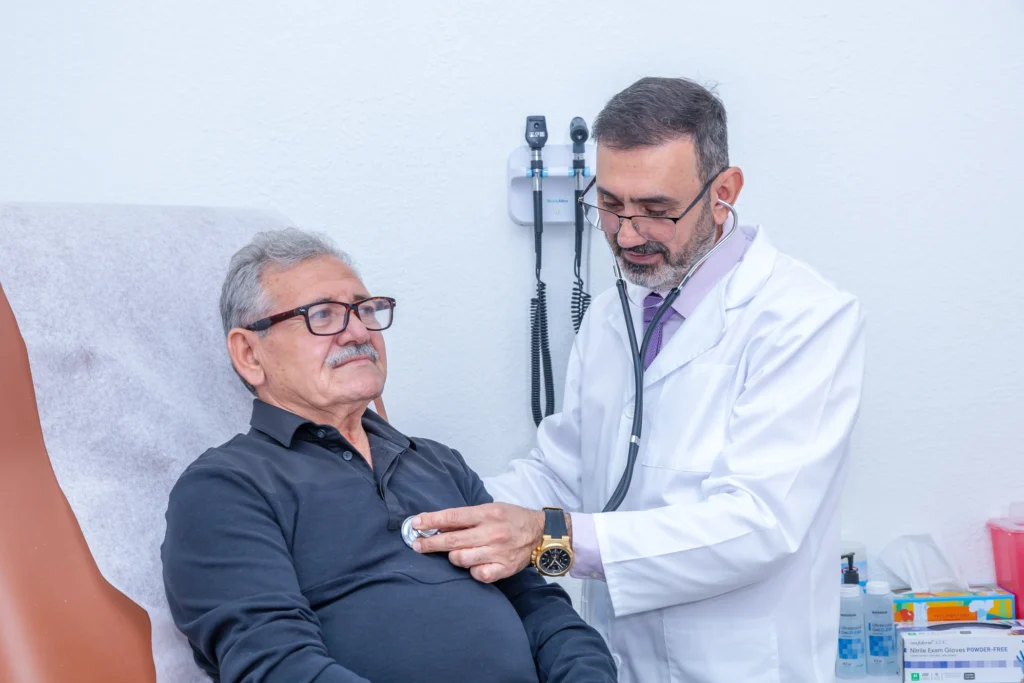Women’s Health Exams: Common Concerns and Questions in 77379 Are you a woman in the 77379 area wondering if you’re really getting the healthcare you need? Do you ever feel confused about which screenings are necessary, or nervous about discussing sensitive topics with your doctor? We understand! Many women share these concerns, and we’re here to provide clarity and support. Why are Women’s Health Exams Important? Regular women’s health exams are crucial for preventive care. They help detect potential issues early, when they are often more treatable. These exams are about more than just reproductive health; they encompass your overall well-being. Common Questions and Concerns Let’s address some common questions and concerns women in our community have about their health. What Happens During a Well-Woman Exam? Review of medical history Physical exam, including breast and pelvic exam Discussion of any health concerns or symptoms Screening tests, such as Pap smear and HPV test Vaccinations, if needed Counseling on healthy lifestyle choices What Screenings are Recommended? Pap Smear: Screens for cervical cancer. HPV Test: Detects the human papillomavirus, which can cause cervical cancer. Mammogram: Screens for breast cancer. Recommendations vary based on age and risk factors. Bone Density Test: Screens for osteoporosis, especially important after menopause. Cholesterol Screening: To assess cardiovascular health. Diabetes Screening: To check for diabetes. Colon Cancer Screening: Discuss options like colonoscopy with your doctor based on age and family history. Considering your options? We can help! Call us at 346-550-8220 or book a consultation to get started. Understanding the Pap Smear and HPV Test Many women find the Pap smear and HPV test confusing. The Pap smear looks for abnormal cells on the cervix, while the HPV test checks for the presence of the human papillomavirus (HPV), a common virus that can cause these abnormal cells. Depending on your age and previous results, these tests may be performed together or separately. Talk to your doctor at 5523 Louetta Rd STE C, Spring, TX 77379, to determine the best screening schedule for you. Navigating Menopause Menopause brings about significant hormonal changes, which can lead to various symptoms. Discussing these changes with your healthcare provider is crucial for managing symptoms and maintaining your quality of life. Hormone Replacement Therapy (HRT) options Lifestyle adjustments for managing hot flashes Bone health and osteoporosis prevention Heart health considerations Comparing Common Screening Methods Screening Purpose Frequency Age Range Pap Smear Cervical cancer screening Every 3 years (or 5 years with HPV co-testing) 21-65 Mammogram Breast cancer screening Annually or biennially 40+ (earlier if high risk) Bone Density Test Osteoporosis screening Varies based on risk factors 65+ (earlier if high risk) Common Women’s Health Concerns Vaginal infections: Symptoms, treatment, and prevention. Urinary Tract Infections (UTIs): Causes, symptoms, and treatment options. Polycystic Ovary Syndrome (PCOS): Management and treatment. Endometriosis: Symptoms, diagnosis, and treatment options. Mental Health: Addressing anxiety, depression, and stress. We also offer services such as Mental Health support. Taking Charge of Your Health Remember, you are your best advocate. Don’t hesitate to ask questions and express any concerns you have during your appointment. Keep track of your menstrual cycle and any unusual symptoms. Maintain a healthy lifestyle with regular exercise and a balanced diet. Practice safe sex to prevent sexually transmitted infections (STIs). Schedule regular check-ups and screenings as recommended by your doctor. FAQs How often should I get a Pap smear? The recommended frequency for Pap smears depends on your age, medical history, and previous results. Generally, women aged 21-29 should have a Pap smear every 3 years. Women aged 30-65 may have a Pap smear every 3 years or a Pap smear with an HPV test every 5 years. When should I start getting mammograms? The American Cancer Society recommends that women aged 40-44 have the option to start screening with a mammogram every year. Women aged 45-54 should get a mammogram every year. Women 55 and older can switch to mammograms every other year or continue yearly screening. Talk to your doctor about what’s best for you, based on your personal risk factors. What if I’m nervous about the pelvic exam? It’s completely normal to feel nervous about a pelvic exam. Communicate your concerns to your doctor. They can explain the procedure and answer any questions you have. Relaxation techniques can also help ease anxiety. For more information on preventative care check out Preventive Screenings Dr. A Patient Care: Your Partner in Women’s Health At Dr. A Patient Care, located conveniently in the 77379 zip code at 5523 Louetta Rd STE C, Spring, TX 77379, we are dedicated to providing comprehensive and compassionate care to women of all ages. Our team is committed to creating a comfortable and supportive environment where you can openly discuss your health concerns. We offer a full range of services, including well-woman exams, screenings, and treatment for various conditions. Learn more about our women’s health services. Our office also provides immunizations. Taking proactive steps towards your well-being, such as scheduling regular women’s health exams, is an investment in your future. At Dr. A Patient Care in the 77379 area, we are dedicated to partnering with you on your journey to optimal health and wellness.
Categories
[all_categories_list]
Easy Online Appointment Booking
One Step Appointment
Booking
At Dr. A Patient Care, we make healthcare simple, accessible, and centered around you.
EXCELLENTTrustindex verifies that the original source of the review is Google. I highly recommend Dr. Muhaned to everyone! He is incredibly knowledgeable and an expert in his field. His personable demeanor and thorough explanations make every visit a positive experience. The office is always clean and runs smoothly which is a big plus. I’d also like to mention one of the medical assistant Afra she was exceptionally kind, professional, and had such a warm demeanor that made me feel at ease right away. Overall the entire team is friendly and dedicated to providing the best care Truly a five-star experiencePosted onTrustindex verifies that the original source of the review is Google. The staff was great, very helpful and welcoming and so was the Doctor. He was such a sweet man.We felt very comfortable with the visit. THANK YOU!Posted onTrustindex verifies that the original source of the review is Google. Update: This has been an absolutely terrible and deeply unethical experience. The office knowingly misled us by claiming they were in-network, despite us confirming multiple times and raising clear concerns. We even pointed out that the deductible amount was clearly stated on the insurance card, yet they continued to insist otherwise and billed us outrageously for routine visits. This wasn’t a simple error — it was intentional and deceptive. Even more disturbing, they require an in-person visit every single time we need a refill — even for chronic, non-controlled medications like those for diabetes and high blood pressure. These are not pain meds. There’s no medical justification for requiring repeated visits just for basic refills — it’s clearly a tactic to generate profit off patients, not to provide care. We’ve filed formal complaints with both the insurance company and the medical board because this kind of behavior is not only unprofessional, it’s unethical and borders on fraud. The staff lacks any understanding of insurance policies, and the office manager is completely unhelpful and uninformed. It’s incredibly disheartening to see a doctor we once trusted — who used to provide excellent care in a previous setting — now run a private practice that puts money above patient care. We will never return, and we urge others to stay far away from this practice.Posted onTrustindex verifies that the original source of the review is Google. This has been an absolutely terrible and deeply unethical experience. The office knowingly misled us by claiming they were in-network, despite us confirming multiple times and raising clear concerns. We even pointed out that the deductible amount was clearly stated on the insurance card, yet they continued to insist otherwise and billed us outrageously for routine visits. This wasn’t a simple error — it was intentional and deceptive. Even more disturbing, they require an in-person visit every single time we need a refill — even for chronic, non-controlled medications like those for diabetes and high blood pressure. These are not pain meds. There’s no medical justification for requiring repeated visits just for basic refills — it’s clearly a tactic to generate profit off patients, not to provide care. We’ve filed formal complaints with both the insurance company and the medical board because this kind of behavior is not only unprofessional, it’s unethical and borders on fraud. The staff lacks any understanding of insurance policies, and the office manager is completely unhelpful and uninformed. It’s incredibly disheartening to see a doctor we once trusted — who used to provide excellent care in a previous setting — now run a private practice that puts money above patient care. We will never return, and we urge others to stay far away from this practice.Posted onTrustindex verifies that the original source of the review is Google. Excelente atención!Posted onTrustindex verifies that the original source of the review is Google. Muy buena atención el doctor muy amable todo perfecto sebe muy bien mi recuperaciónPosted onTrustindex verifies that the original source of the review is Google. Pense que era una clínica super especializada todos muy amables. La primera vez que visite 19 de octubre. Para el control de peso y todo hiba bien asta que el 25 de enero los visite y resulta que pague igual por medicamento pero para mi sorpresa solo recibí la mitad. Llamé y llamé tanto al clínica como la farmacia pero al final resultó la clínica una mentirosa .porque me fui con el farmacéutico y el dijo la verdad el doctor solo pago por la mitad no por los 3 meses .al principio el se mostró un poco antipático pero en unos minutos asta me alcanzo asta el carro para explicarme y decirme que no me preocupara qué el va a darme el resto de mi tratamiento pero aria una nota en su expediente al final le agradezco al farmacéutico el entendió lo que estaba pasando .la verdad me siento estafada..Posted onTrustindex verifies that the original source of the review is Google. Dr. Mohaned is truly an outstanding doctor. From start to finish, my experience was smooth, professional, and comforting. He took the time to listen to my concerns, explained everything in a clear and reassuring way, and made sure I felt heard and cared for. His knowledge and gentle approach made a big difference, and I never felt rushed or overlooked. The entire team was also warm, organized, and efficient, creating a welcoming and supportive environment. It’s rare to find such a perfect balance of expertise and genuine compassion. I highly recommend Dr. Mohaned and his team for anyone seeking excellent, patient-focused cateVerified by TrustindexTrustindex verified badge is the Universal Symbol of Trust. Only the greatest companies can get the verified badge who has a review score above 4.5, based on customer reviews over the past 12 months. Read more
Insights


